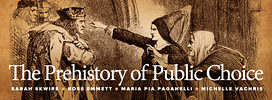Lead Essay
Sarah Skwire looks at the implicit economics of Shakespeare’s plays, in which self-interested politicians vie with one other for advantage. These plays, particularly the histories, reflect a keen awareness of the uses of politics for personal advantage, and of the incentives that work on state agents just like they work on the rest of us. Skwire argues that Shakespeare falsifies the notion that the economic way of thinking was an 18th-century construction, and that premodern people did not think about costs and benefits in the same ways that we now do.
Response Essays
Ross Emmett agrees with Sarah Skwire that literature can be informative about public choice, and that pre- and early modern authors often showed more understanding of the problems of political economy than later critics might suppose. He proposes some origins for Gordon Tullock’s curious assertion that premodern authors had a romantic view of politics. These include a change in historical ideas about political economy that was first described by Frank Knight, as well as a litany of 19th- and early 20th-century English-language authors including Arnold Toynbee, William Wordsworth, John Ruskin, and George Bernard Shaw, all of whom did much to romanticize our ideas about politics.
Maria Pia Paganelli examines the theme of rent seeking in Adam Smith’s Wealth of Nations. Why was it, Smith asked, that businessmen were the most likely to ask for government favors, and why had they demanded – and received – an expensive and dangerous empire? The reason was simple self-interest, he concluded, combined with the unequal distribution of costs and benefits these measures entailed. Although hints of public choice can be found earlier, it’s with good reason that Smith is seen as an important figure.
Michelle Vachris argues that Gordon Tullock did make a good point when he characterized premodern political economists’ thinking as romantic. The paradigm of the bad legislator in the Theory of Moral Sentiments, for example, was not a self-interested or venal official, but rather the “man of system” who wished to achieve a particular plan of society. Literature, though, may have been more sophisticated; Vachris looks to Mark Twain and Charles Dudley Warner for several examples of public choice-like thinking in the nineteenth century.
Coming Up
Conversation through the end of the month.

